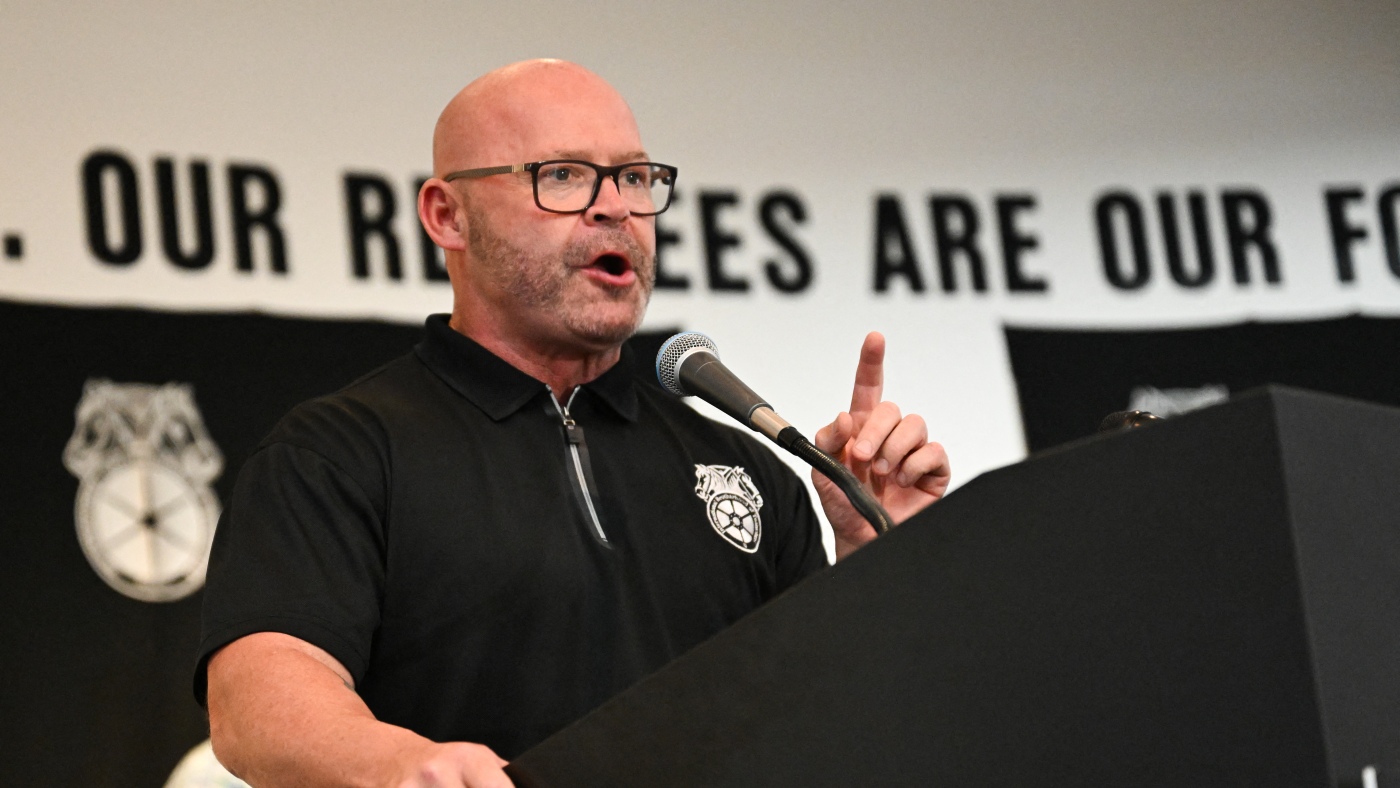[ad_1]
Good morning. You’re reading the Up First newsletter. Subscribe here to get it delivered to your inbox, and listen to the Up First podcast for all the news you need to start your day.
Today’s top stories
Another deadly wave of exploding communication devices — this time walkie-talkies — struck Lebanon yesterday, leaving at least 20 dead and hundreds more wounded, according to Lebanese Health officials. The new explosions happened barely 24 hours after pagers exploded, killing 12 people and injuring almost 3,000. In some cases, the walkie-talkies blew up during funerals for people killed during the pager explosions. Israel hasn’t publicly taken responsibility for this week’s attacks on Hezbollah, but a U.S. official tells NPR that Israel notified Washington it carried out Tuesday’s attacks.

An ambulance believed to be carrying wounded people, after multiple explosions were heard during the funeral of four Hezbollah fighters who were killed Tuesday after their handheld pagers exploded, in a southern suburb of Beirut, Lebanon, Wednesday.
Bilal Hussein/AP
hide caption
toggle caption
Bilal Hussein/AP
- 🎧 NPR’s Jane Arraf heard one of the latest explosions yesterday while she was attending a Hezbollah funeral with producer Jawad Rizkhallah. She tells Up First that as the speaker began to call the names of the dead and the band began to play, a bang was heard, and nearby someone shouted that a person’s hand was blown off. Hezbollah has vowed revenge. The group’s leader, Hassan Nasrallah, is giving an address this evening. People are unsettled in the area. They’re afraid of electronic devices, as it’s unknown when something might explode.
- 🎧 What is happening with the exploding communication devices is something that has never been seen before, NPR’s Greg Myre says. Many analysts say there is no military solution and there will have to be a political one. Hezbollah has been signaling for the past year that it doesn’t want a full-scale war. As it considers a counter-strike, there’s a possibility Hezbollah could keep up the ongoing exchange of cross-border fire, but choose not to ramp up the fighting.
The International Brotherhood of Teamsters is not endorsing a candidate for president, setting them apart from other labor unions that have been active in the year’s elections. It breaks with decades of Teamsters precedent and comes as a blow to Vice President Harris, who met with union leadership for a roundtable discussion Monday. The union released an internal poll yesterday that showed nearly 60% of members wanted former President Donald Trump back in the White House. Trump later boasted that he won the Teamsters’ endorsement. Harris has won the support of many labor groups, including the United Auto Workers, the AFL-CIO, the National Education Association and American Federation of Teachers, and the Culinary Union in Nevada.
- 🎧 NPR’s Don Gonyea says the decision is unusual, as Teamsters have backed every Democratic nominee since Bill Clinton, including President Biden. The union’s president, Sean O’Brien, praised Trump in a pro-union speech at the Republican National Convention in July. The decision wasn’t solely made based on the polling. Harris doesn’t have a long history with the union like Biden does, though she’s said she’ll continue his pro-labor policies.
Black girls face more discipline and severe punishment, like expulsion, in public schools than girls of other racial backgrounds, according to a report shared exclusively with NPR by the Government Accountability Office. The report took nearly a year-and-a-half to complete and provides a first-of-its-kind snapshot of the disciplinary disparities that Black girls face across the U.S. within public school systems. Some of the factors that tied into the increased discipline include school poverty levels, the percentage of girls facing disabilities, the number of new teachers and the presence of a school resource officer. The report is set for release by the congressional watchdog today, here’s a breakdown of what it reveals.
Life advice

Even if you use a credit card all the time, it can be difficult to understand the ins and outs of how they work.
We Are/Getty Images
hide caption
toggle caption
We Are/Getty Images
Falling behind on credit card bills is more common than you might think, especially when the ins and outs of how they work can be confusing. According to the Federal Reserve Bank of New York, people under the age of 30 and lower-income families in the U.S. are the most likely to be maxed out on their credit limit. This puts them at a greater risk of missing a payment. John Kiernan, managing editor at the personal finance website WalletHub, says there are ways to keep your bills under control.
- 💳 Avoid costly interest charges by paying your full statement balance every month. The day a payment is missed, interest and late fees start adding on to the balance.
- 💳 Try not to lose your grace period — the interest-free period many companies offer between when you buy something and the credit card payment is due. Once it goes away you’ll start accruing interest every day on everything you buy going forward.
- 💳 Can’t pay the full balance? Make a minimum payment, the smallest amount required to pay each month to keep your account in good standing.
- 💳 Create a strategy to pay off the debt. There are free online calculators to help you do it.
Here’s the full list of tips to help stay out of debt.
Picture show

The Scranton Army Ammunition Plant in Scranton, Pa., on Aug. 27.
Daniel Vasta for NPR
hide caption
toggle caption
Daniel Vasta for NPR
Morning Edition visited the Scranton Army Ammunition Plant to get an inside look at how its defense equipment production contributes to northeastern Pennsylvania’s economy. The plant’s development of artillery rounds has ramped up since Russia’s full-scale invasion of Ukraine. Scranton, once a hub for coal mining and small American manufacturing, now relies on defense installations for good, high-paying jobs. Keeping up with Ukraine’s needs isn’t easy.
3 things to know before you go

A tug boat travels toward the Port of Baltimore as salvage crews continue to clean up wreckage from the collapse of the Francis Scott Key Bridge in the Patapsco River on June 11 in Baltimore. The city’s Fort McHenry Federal Channel opened for shipping traffic months after the cargo ship Dali collided with the bridge, causing it to collapse.
Kevin Dietsch/Getty Images
hide caption
toggle caption
Kevin Dietsch/Getty Images
- The Justice Department is suing the owner and operator of the container ship Dali for more than $100 million, alleging that negligence and cost-cutting decisions led to the ship ramming into and destroying Baltimore’s Francis Scott Key Bridge in March.
- In Indian-controlled Kashmir, residents are voting in local elections for the first time in a decade. Some cast their ballots hoping it will lead to the restoration of the territory’s statehood, which ended when it became federally governed in 2019.
- Shaboozey’s “A Bar Song (Tipsy)” has entered an exclusive club: It’s one of 45 songs since the establishment of Billboard’s Hot 100 in 1958 to top the chart for at least 10 weeks.
This newsletter was edited by Suzanne Nuyen.
[ad_2]
Source link


